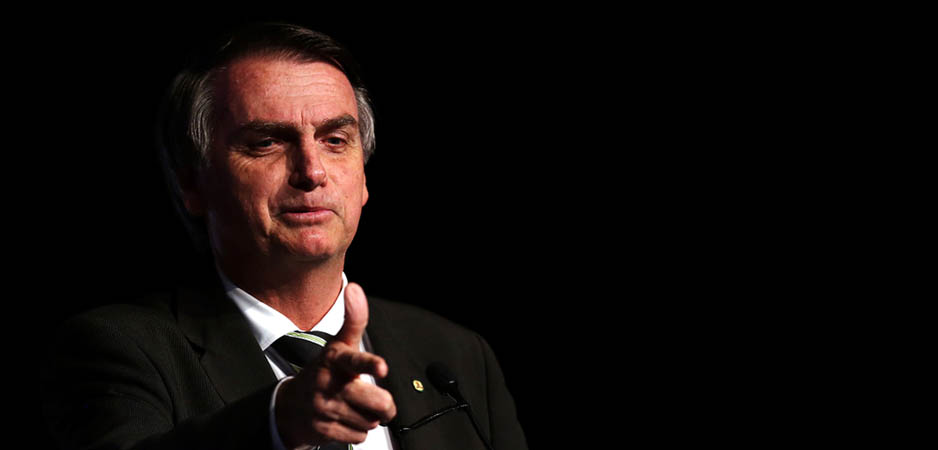Jair Bolsonaro thinks he and friends are good guys and that if they have the firepower to go after the bad guys, order in a lawless land will be restored.
Brazilian President Jair Bolsonaro followed through with his promise to turn the entire nation into a movie set for a remake of The Wild Bunch, where the good guys and the bad guys will be able to shoot it out to see who prevails, thanks to which the distinction between good and bad will be forever lost. Bolsomito — as his fans on the extreme right like to call him — signed a presidential order on May 7 that “would grant millions of citizens the right to carry loaded weapons in public.”
Here is today’s 3D definition:
Loaded:
1: Concerning firearms: containing one or more bullets for the purpose of killing or causing injury
2: Applied to people: drunk, after having consumed an excessive amount of alcohol
3: Ready to strike, with or without provocation, or just for the fun of it
4: Extremely rich and, therefore, likely to act irresponsibly thanks to the power money confers
Contextual note
Brazil hasn’t yet capitulated to Bolsonaro’s plan to turn the nation into the dog-shoot-dog republic. On May 10, a supreme court judge backed an opposition party’s complaint that the order is unconstitutional. Bolsonaro has five days to justify its compliance with the constitution. True to his nature — that of a populist despot equally obsessed by applying the law as severely as possible and flouting — the president plays it both ways. He first admitted that if the decree were shown to be unconstitutional, it would cease to exist. Then, hours later, he spouted defiantly: “We are not retreating in front of those that since forever have said they are security experts.”
To justify liberating the sale and ownership of weapons and allowing a virtually unlimited supply of ammunition (5,000 cartridges per year), Bolsonaro refers to the Manichean ethical view familiar to adepts of the National Rifle Association (NRA) in the US. “The life of a good citizen has no price,” Bolsonaro proudly asserts. And he knows who the “good citizens” are. Their skin tends to be pale and they generally own property that must be defended. ABC News quotes Robert Muggah, the research director of the Igarape Institute. As a result of this law, he anticipates “a dramatic increase in the circulation of firearms in northern, northeastern and midwest Brazil,” regions where currently raging are many disputes “between landowners and indigenous communities.”
The fact that the law of vengeance may put people at risk doesn’t seem to faze Bolsonaro. So long as the propertied class is sufficiently armed, the peasant, indigenous and criminal classes can be fended off.
But the real contradiction in the president’s claim to be protecting “the life of a good citizen” lies in the extensive evidence that exists of the Bolsonaro family’s links with known criminals. His ability to distinguish the “good” from the “bad” may thus appear somewhat suspect.
Historical note
Like Donald Trump in the US, Bolsonaro appealed to the religious right to win the election in October 2018. A Catholic married to an Evangelical, Bolsonaro appealed to the two dominant religious groups for support. “[H]e filled his stump speeches with religious rhetoric and made dozens of campaign videos meant to appeal to religious Christians,” writer Catherine Osborn in Foreign Policy. The principal difference between Brazil and the US appears to be that Brazilian Christians are ready to judge Bolsonaro on results — notably his promise to end corruption — and appear ready to withdraw their support if he fails. They may have retained from their Biblical readings: “By their fruits you shall know them” (Matthew 7:16). In contrast, Evangelicals and the religious right in general have shown themselves to be impervious to President Trump’s moral and political failures. They appear to be with him till doomsday.
 The key to Bolsonaro’s electoral success lay not just in the way the judicial system prevented the candidate who was the most popular and most likely to win — former President Luiz Inácio Lula da Silva — from running, but by his repeated intent of engaging whatever tactics are necessary, however violent and undemocratic, to reduce the criminality that affected so many people’s lives. As Al Jazeera describes, Bolsonaro is someone “who swept to power in a highly divisive October election on a law-and-order platform that included easing restrictions on guns.” He calls his executive order “another step towards freedom and individual rights in our nation”. Once again, this echoes the far-right ideology of the US that sees gun ownership as an inalienable right.
The key to Bolsonaro’s electoral success lay not just in the way the judicial system prevented the candidate who was the most popular and most likely to win — former President Luiz Inácio Lula da Silva — from running, but by his repeated intent of engaging whatever tactics are necessary, however violent and undemocratic, to reduce the criminality that affected so many people’s lives. As Al Jazeera describes, Bolsonaro is someone “who swept to power in a highly divisive October election on a law-and-order platform that included easing restrictions on guns.” He calls his executive order “another step towards freedom and individual rights in our nation”. Once again, this echoes the far-right ideology of the US that sees gun ownership as an inalienable right.
But, in yet another parallel with the US, Ilona Szabo de Carvalho, executive director of the Igarape Institute, quoted by Al Jazeera, points out that: “Nowhere in our constitution is it stated that we have a right to guns, it says we have a right to public security.”
This would actually be a correct reading of the US constitution’s second amendment, which specifically authorizes the creation of state militias to ensure “public security.” Alas, the original formulation, to differentiate the population under the authority of state governments from the federal government, referred to this authorization of the states to organize their system of policing as the “right of the people,” which has now come to mean even in the eyes of the courts, the right of individuals to equip themselves to enforce the law by violent means.
At some point this week, we will have a better idea of Brazil’s capacity to avoid such misreadings of the law.
*[In the age of Oscar Wilde and Mark Twain, another American wit, the journalist Ambrose Bierce, produced a series of satirical definitions of commonly used terms, throwing light on their hidden meanings in real discourse. Bierce eventually collected and published them as a book, The Devil’s Dictionary, in 1911. We have shamelessly appropriated his title in the interest of continuing his wholesome pedagogical effort to enlighten generations of readers of the news.]
The views expressed in this article are the author’s own and do not necessarily reflect Fair Observer’s editorial policy.
Support Fair Observer
We rely on your support for our independence, diversity and quality.
For more than 10 years, Fair Observer has been free, fair and independent. No billionaire owns us, no advertisers control us. We are a reader-supported nonprofit. Unlike many other publications, we keep our content free for readers regardless of where they live or whether they can afford to pay. We have no paywalls and no ads.
In the post-truth era of fake news, echo chambers and filter bubbles, we publish a plurality of perspectives from around the world. Anyone can publish with us, but everyone goes through a rigorous editorial process. So, you get fact-checked, well-reasoned content instead of noise.
We publish 2,500+ voices from 90+ countries. We also conduct education and training programs
on subjects ranging from digital media and journalism to writing and critical thinking. This
doesn’t come cheap. Servers, editors, trainers and web developers cost
money.
Please consider supporting us on a regular basis as a recurring donor or a
sustaining member.
Will you support FO’s journalism?
We rely on your support for our independence, diversity and quality.






